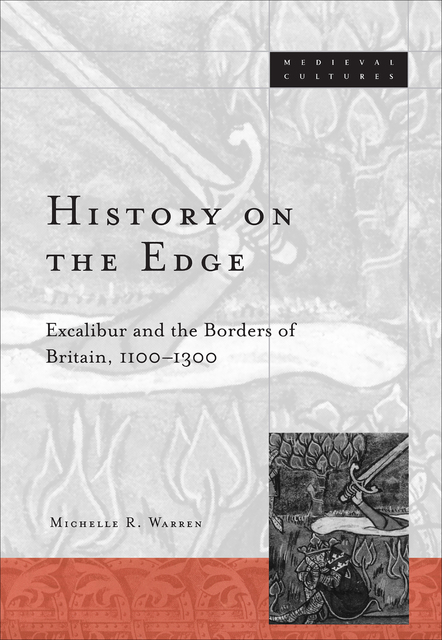History on the Edge
Excalibur and the Borders of Britain, 1100–1300

The Arthurian legends are history written on the edge-stories whose changing shape reflects the contested borders of medieval Britain. This is the argument Michelle R. Warren makes in this investigation of medieval history through the lens of postcolonial theory.
Warren shows how Geoffrey of Monmouth’s foundational Historia regum Britanniae engages in an ambivalent cultural struggle with the past. She traces this history’s travels through Wales, where translators and editors recast it as a narrative of resistance to colonialism, and into southern England, where, in English, it becomes a retaking of British history from Norman domination.
As the Arthurian texts cross the Channel, Warren shifts her focus to Continental narratives. Here we see how, in Normandy, Wace’s Roman de Brut shares the aggressive vision of the Welsh, but from the perspective of the colonizers. In Champagne, resistance to the French monarchy engenders the monumental Arthurian prose cycle; and finally, in Brittany, Arthurian history becomes a moralized fable of acquisitive greed in the Gesta regum Britanniae. In conclusion, Warren turns to an exemplary scene of colonial contact-Amerigo Vespucci’s naming of America-to demonstrate how medieval histories open new readings of modern colonial discourse.
Background photo by Pixabay
Table of Contents
Metadata
- rightsParts of chapters 1 and 2 originally appeared as “Making Contact: Postcolonial Perspectives through Geoffrey of Monmouth’s Historia regum Britannie,” Arthuriana 8, no. 4 (1998): 115–34; reprinted courtesy of Arthuriana. Parts of chapter 6 originally appeared as “Designing the End of History in the Arming of Galahad,” Arthuriana 5, no. 4 (1995): 45–55; reprinted courtesy of Arthuriana. Parts of chapter 6 also appeared as “Marmiadoise of Greece: The Fall of Ancient History in the Estoire de Merlin,” Romance Languages Annual 9 (1997): 141–48; copyright Purdue Research Foundation, reprinted with permission, all rights reserved.
Copyright 2000 by the Regents of the University of Minnesota
- isbn978-1-4529-6957-2
- publisherUniversity of Minnesota Press
- publisher placeMinneapolis, MN
- restrictionsAll rights reserved. No part of this publication may be reproduced, stored in a retrieval system, or transmitted, in any form or by any means, electronic, mechanical, photocopying, recording, or otherwise, without the prior written permission of the publisher.
- rights holderRegents of the University of Minnesota
- series number22
- series titleMedieval Cultures Series
We use cookies to analyze our traffic. Please decide if you are willing to accept cookies from our website. You can change this setting anytime in Privacy Settings.



